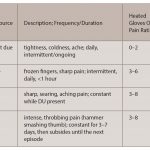WASHINGTON (Reuters)—President Donald Trump on Monday said he will nominate former pharmaceutical executive and industry lobbyist Alex Azar to serve as U.S. Health and Human Services secretary, saying Azar would push to lower the price of medicines. If confirmed, Azar also would take the lead in implementing Trump’s campaign promise to dismantle the Affordable Care…

2017 in Review: Key Findings in Basic Science Highlighted at the ACR/ARHP Annual Meeting
During the ACR/ARHP Annual Meeting, Richard Pope, MD, highlighted some of the top scientific literature on rheumatic disease from 2017. The review session discussed research on the effects of microglia on the central nervous system of SLE patients, the role of adenosine in osteoarthritis and more…
Psoriasis Tied to Higher Risk of Serious Liver Disease
(Reuters Health)—People with chronic inflammatory disorders, such as psoriasis and rheumatoid arthritis (RA), may have an increased risk of developing serious liver damage, a recent study suggests. These inflammatory disorders are often treated with methotrexate, a medication linked to an increased risk of liver disease. For the current study, researchers followed more than 1 million…

Eat to Fight Inflammation & Promote Weight Loss
Managing weight loss through diet may help patients with rheumatic disease reduce inflammation. Here are some strategies on weight loss and eating for rheumatologists and patients…

Heated Gloves Provide Relief from Hand Pain, Dysfunction in Diffuse Systemic Sclerosis
Raynaud’s phenomenon in scleroderma or systemic sclerosis (SSc) is associated with significant discomfort and functional disability, especially in the presence of digital ulcers.1 Having lived with diffuse systemic sclerosis (dSSc) for nearly a decade, I can attest to this. It has been my experience that the hand pain and dysfunction in dSSc stems from Raynaud’s…

Rheumatology Case Report: TINU Syndrome with Concomitant Synovitis
Tubulointerstitial nephritis and uveitis (TINU) syndrome, also known as Dobrin syndrome, is a rare oculo-renal inflammatory disease. It was first described in 1975 by American physician Robert Dobrin, MD.1 It manifests as acute interstitial nephritis and bilateral uveitis. In addition, patients often experience nonspecific systemic findings, such as fever, weight loss, malaise, myalgia and arthralgia. TINU…

Rheumatologist’s Ping-Pong Prowess Sharpens His Skills with Patients
Roughly 15 years ago, Steven K. Magid, MD, rheumatologist and chief medical information officer at the Hospital for Special Surgery (HSS) in N.Y., attended a social event for hospital employees. While chatting with other physicians, nurses, and lab techs, he watched one of his colleagues slaughter her opponents at Ping-Pong. “She was very skilled,” recalls Dr. Magid,…

Rheumatology Drug Updates: Efficacy Studied Following Accelerated Drug Approvals; Plus Secukinumab Meets Benchmark for Psoriasis
Medications for serious or life-threatening conditions may receive accelerated approval from the U.S. Food and Drug Administration (FDA) by showing an effect on surrogate measures that are reasonably likely to predict a treatment’s clinical benefit. Post-approval confirmatory drug trials are then required to determine whether or not these effects translate into clinical improvements. In recent…
Rheumatology Coding Corner Answer: Evaluation for Possible Systemic Lupus Erythematosus
Take the challenge. CPT codes: 99245/99205 ICD-10: M79.1, R21, R53.83, L65.9, K13.79, R00.0 This visit can be billed out as a 99245 only if the insurance carrier allows the billing of consultation codes. If the carrier does not allow consult codes, then this visit must be billed as a new patient visit. Because many outpatient…
Rheumatology Coding Corner Question: Evaluation for Possible Systemic Lupus Erythematosus
History A 25-year-old female patient is seen in the office after her primary care physician requested a consultation for a possible diagnosis of systemic lupus erythematosus (SLE). The patient presents today with muscle pain in both legs, she rates the pain at an 8 on a scale of 10. She states she experiences throbbing, usually…
- « Previous Page
- 1
- …
- 407
- 408
- 409
- 410
- 411
- …
- 842
- Next Page »